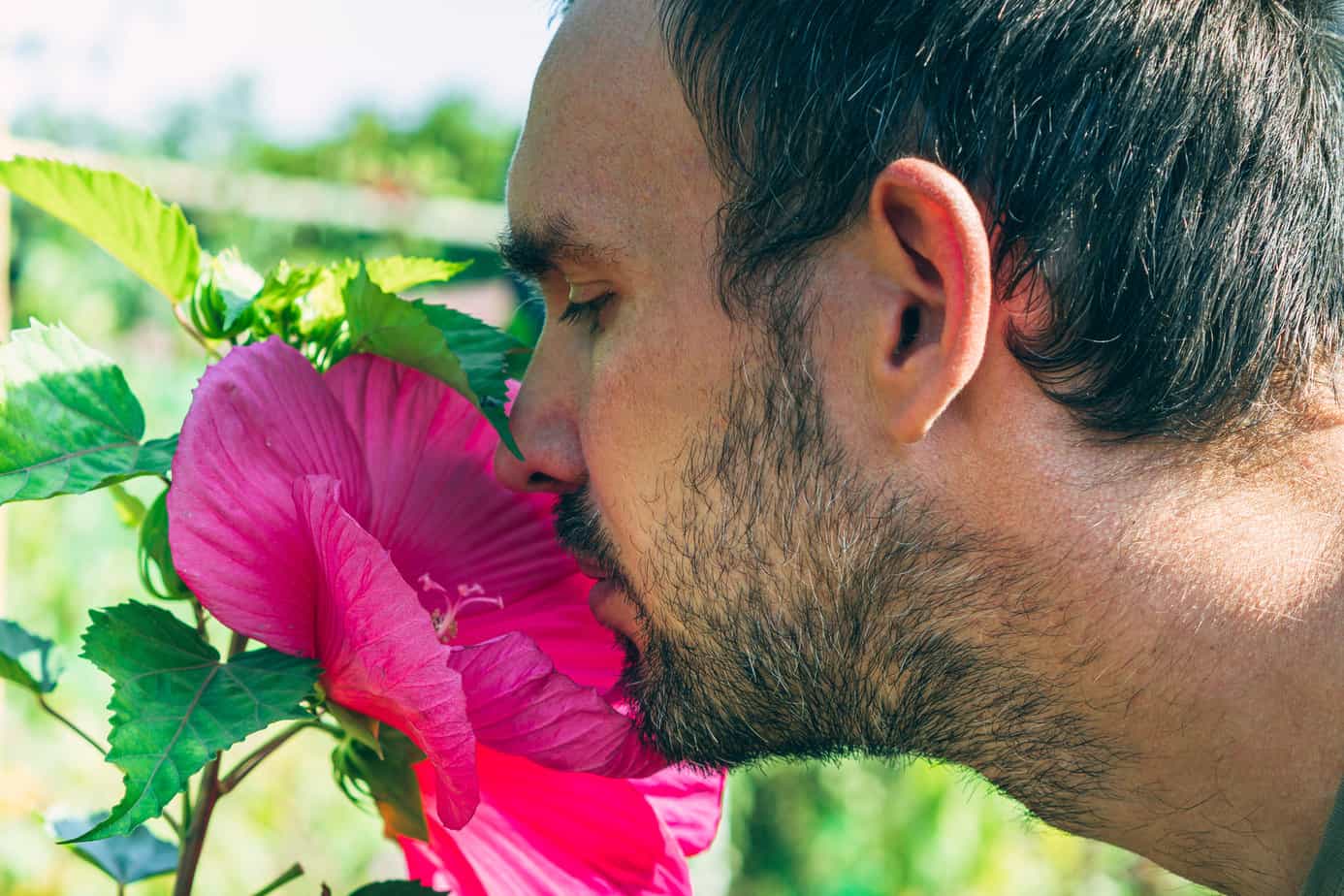Welcome back to another installment of PLANT 101. A series of articles we like to write that will explore the botanical world, one plant at a time, answering all those burning questions along the way 🙂 (that’s the plan anyway!!)
Today we are looking at the Hibiscus and answering the simple question ‘what does it smell like?’ or does it in fact smell at all!! If this is a question you have ever asked yourself, please read on to find out the answer to this question (and a few others!).
What Does Hibiscus Smell Like?
The majority of hibiscus flowers have no aroma at all. They smell like pure air, and some other varieties of hibiscus have mild smells like sweet, tropical, floral, and tart fragrance. Any hibiscus variety doesn’t have a smell and can’t be distilled into a fragrance oil.
What Does Hibiscus Scent Smell Like?
Hibiscus has no aroma in general. Only a portion of hibiscus flowers is fragrant. Their aroma is very gentle, reminiscent of sweet aroma and tropical nature. Hibiscus fragrance is one of only a handful (of hundreds) of scented hibiscus blossoms, and only the seeds have a lovely tropical smell.
Does Hibiscus Flower Have A Smell?
We can conclude that hibiscus flowers generally have no smell with the above answers. Only a few of their varieties smell floral. These flower scents are so light and rarely last that they go unnoticed. Their fragrance doesn’t persist for long.
Does Hibiscus Tea Smell Good?
Hibiscus tea is a herbal tea made by steeping hibiscus plant pieces in boiling water. The hibiscus tea has relaxing benefits. It has barely any intense aroma or intense smell. With just a little bit of added sweetening, you can enjoy hibiscus tea benefits without any strong smell.
How Would You Describe Hibiscus Flavour?
Hibiscus flavor can be deceptive to many. It has a mixed profile of flavor that includes sweet, fruit, sour, and astringent notes. Due to its tart-like flavor, it is flavored as cranberry and can be used to make hot tea or iced tea.
What Are The Major Species Of Hibiscus?
The major tropical species is Chinese hibiscus, which may reach 4.5 meters in height but generally doesn’t exceed 2 meters in cultivation. It is also called china rose. An east African hibiscus is another major species that generally grow in a hanging basket.
What Are The Nutritional Benefits Of Hibiscus?
Eating hibiscus raw or cooked like tea can have various nutritional benefits. It has been found that hibiscus can act as antioxidants and helps cure health issues such as liver, heart, blood pressure, etc. Some varieties of hibiscus flowers are rich in iron, calcium, ascorbic acid, anthocyanin, and many other required nutritional values.
What Are The Benefits And Uses Of Hibiscus?
The various hibiscus flowers are rich in nutritional values and help cure many health issues. Some of the crucial health issues that hibiscus can cure are:
- Blood Pressure
Several hibiscus drinks and supplements have been found to cure blood pressure to a great extent. A study has shown that drinking 2 cups of hibiscus tea daily for a month with dietary changes and a controlled lifestyle can positively cure blood pressure.
- Obesity
Hibiscus can also help in controlling weight loss and curing obesity. Problems like fatty acids are avoidable as hibiscus can prevent fatty cells from accumulating together. Due to fiber in certain hibiscus preparation, problems like heavyweight are controlled.
- Metabolic Syndrome
A metabolic syndrome is a group of risk factors, including high blood sugar, high triglyceride levels, low HDL (good) cholesterol levels, and excess body fat. These variables can raise the chances of getting heart disease and diabetes. Having hibiscus powder can manage aspects of metabolic syndrome and its risk factors.
- Liver Damage
Hibiscus may also protect your liver from obesity, diabetes, or some drugs. In mice with diabetes and obesity, the colorful anthocyanins in the hibiscus enhanced liver antioxidant enzymes, protected against oxidative stress, and decreased liver fat storage.
- Cancer
Hibiscus antioxidant chemicals may also have anti-cancer effects. Test tube studies reveal that hibiscus extract may inhibit enzymes involved in the development of prostate cancer and cause the death of breast cancer and melanoma cells. Hibiscus may even improve the efficacy of chemotherapy on breast cancer cells.
What Are The Side Effects Of Hibiscus?
There is no such standard maintained for consuming hibiscus in quantity. For example, hibiscus tea is safe when consumed in a normal amount. Other extracts, powder, and capsules don’t have any specific ideal consumable quantity. However, pregnant and breastfeeding females should avoid using hibiscus consumption as there is no evidence of safe usage.
What Are The Essentials For Growth Of Tropical Hibiscus?
The tropical hibiscus has different experiences to offer you in both warmer and colder climates. For them not to disappoint you, they require:
- Light
A hibiscus plant loves sunlight more than anything. But in northern areas, there might be unbearable heat. Consider shifting your plant under a shade. If your plant is blossoming more in the sun, it’s doing good. If not, consider shifting it to a new place.
- Soil
For tropical hibiscus, it is better if the soil is well-drained. The soil has to have organic elements to help the plant grow at its best. It doesn’t let the root break due to the absence of rich soil in potted plants or outdoors.
- Water
Tropical hibiscus needs water like anything. However, it largely depends on the heat, wind, and the environment of the planted place. It needs daily water, and you would need to water twice a day for some. Ideally, the hibiscus needs 1 to 2 inches of water weekly.
- Temperature
The ideal temperature for hibiscus is 50 to 70 degrees Fahrenheit on average. Consecutive night temperatures below 50 would kill it. So, if it is cold outside, consider keeping it inside your home.
- Fertilizer
The potted hibiscus has a slow-release fertilizer mixed into the solid and doesn’t need additional feeding for the first few months. After that, a dilute fish emulsion fertilizer feeding will keep it blossomed for a long time.
FAQ
Does Hibiscus Smell Tart-Like?
Yes, those who have smelt different species of hibiscus blooms frequently mention the tart-like taste and fragrance of hibiscus. Some people say that they smell like cranberry. It is more likely a sour aroma associated with budding flowers than a strong, fragrant fragrance.
What Does Hibiscus Symbolize?
Hibiscus blossoms are seen to be highly feminine. As a result, they are typically given to women. Hibiscus blossoms represent the ideal woman or wife in North America. Otherwise, the flower’s symbolism differs based on its hue and the culture to which it is given. Hibiscus symbolizes love, romance, peace, happiness, and wellness in different cultures and societies.
What Does Hibiscus Attract?
Hibiscus are bright-colored plants, usually red, yellow, white, and pink. They mostly attract butterflies and hummingbirds. It has vibrant colors, a unique smell, and a nectar-sharing shape, making them a fascinating attraction to hummingbirds.
Does Hibiscus Smell Sweet?
Yes! Many hibiscus varieties have an odor like sweet and tart fragrance. The smell is very rare to identify and can go unnoticed.
Does Hibiscus Have A Very Mild Scent?
While many hibiscus plants have no smell at all, some of the hibiscus plants have a modest or a very mild scent.
Conclusion
Hibiscus is a flowering plant native to tropical regions. It imbibes several substances that may be beneficial to your health. It is consumable in the form of teas, capsules, powders, and extracts. It can help decrease blood pressure and metabolic control syndrome, among other things—still research required to back up its effects on humans. Knowing the benefits and the right way to use hibiscus can be helpful.



